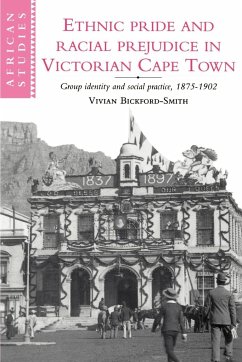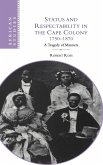An original contribution to South African urban history, focusing on the English merchant class.
Nineteenth-century Cape Town, the capital of the British Cape Colony, was conventionally regarded as a liberal oasis in an otherwise racist South Africa. Longstanding British influence was thought to mitigate the racism of the Dutch settlers and foster the development of a sophisticated and colour-blind English merchant class. Vivian Bickford-Smith skilfully interweaves political, economic and social analysis to show that the English merchant class, far from being liberal, were generally as racist as Afrikaner farmers. Theirs was, however, a peculiarly English discourse of race, mobilised around a 'Clean Party' obsessed with sanitation and the dangers posed by 'un-English' Capetonians in a period of rapid urbanisation brought about by the discovery of diamonds and gold in the interior. This original contribution to South African urban history draws on comparative material from other colonial port towns and on relevant studies of the Victorian city.
Table of content:
List of illustrations; List of tables; Preface; Acknowledgements; Note on terminology; List of abbreviations; 1. Introduction; 2. The world that commerce made; 3. Problems of prosperity; 4. White ethnicity, racism and social practice; 5. The dangers of depression; 6. Problems of prosperity revisited; 7. Ethnicity and organisation among Cape Town's workers; 8. A darker shade than pale?; 9. Conclusion; Notes; Bibliography; Index.
Nineteenth-century Cape Town, the capital of the British Cape Colony, was conventionally regarded as a liberal oasis in an otherwise racist South Africa. Longstanding British influence was thought to mitigate the racism of the Dutch settlers and foster the development of a sophisticated and colour-blind English merchant class. Vivian Bickford-Smith skilfully interweaves political, economic and social analysis to show that the English merchant class, far from being liberal, were generally as racist as Afrikaner farmers. Theirs was, however, a peculiarly English discourse of race, mobilised around a 'Clean Party' obsessed with sanitation and the dangers posed by 'un-English' Capetonians in a period of rapid urbanisation brought about by the discovery of diamonds and gold in the interior. This original contribution to South African urban history draws on comparative material from other colonial port towns and on relevant studies of the Victorian city.
Table of content:
List of illustrations; List of tables; Preface; Acknowledgements; Note on terminology; List of abbreviations; 1. Introduction; 2. The world that commerce made; 3. Problems of prosperity; 4. White ethnicity, racism and social practice; 5. The dangers of depression; 6. Problems of prosperity revisited; 7. Ethnicity and organisation among Cape Town's workers; 8. A darker shade than pale?; 9. Conclusion; Notes; Bibliography; Index.








